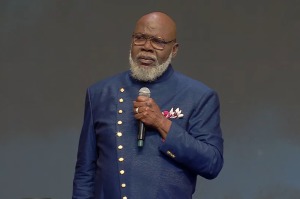Evangelicals and Climate Change: Global Warming Skeptics (Pt. 3)
Editor's note: In part three, the final installment of CP's series on evangelicals and climate change, the focus is on an argument by skeptics that opportunities are being lost to help the poor because of a focus on global warming.
Global warming skeptics argue that while global warming activists say that reducing carbon dioxide emissions is necessary to protect the poor and vulnerable, the science is so iffy and the cost of control so high that money would be better spent on direct aid to the poor.
The Cornwall Alliance is the primary organization representing this view. In 2006, Cornwall Alliance published a document, "A Call to Truth, Prudence, and Protection of the Poor: An Evangelical Response to Global Warming," that was a direct response to the Evangelical Climate Initiative's "Climate Change: An Evangelical Call to Action," discussed in part two of this series. In an interview with The Christian Post, Dr. E. Calvin Beisner explained his belief that the global warming caused by burning fossil fuels will be small and may have more benefits than harms to the environment. Beisner, a former theology professor and economics professor, is the founder and national spokesperson for Cornwall Alliance.
Multiplier Effects
The amount of carbon in the atmosphere has gone from about 270 parts per million in pre-industrial times to about 393 parts per million today. That sounds like a lot, Beisner agreed, but when looked at as a proportion of the overall atmosphere, he argues it is "minuscule." It means the proportion of carbon dioxide in the atmosphere went from 0.027% to 0.039%. Doubling the amount of carbon dioxide in the atmosphere, Beisner said, would increase the Earth's temperature by 1.2 degrees Celsius, he says.
The International Panel on Climate Change (IPPC), an organization formed by the United Nations to assess the impact of climate change, predicts that the Earth will warm much more than one degree Celsius because of "multiplier effects." This means that the warming caused by additional carbon in the atmosphere will lead to other events that will cause additional warming. Higher temperatures, for instance, will cause more evaporation and, thus, more water vapor in the atmosphere. Also, higher temperatures will cause more snow and ice to melt, which means there will be less white on the Earth's surface to reflect heat.
Beisner believes that the IPPC is overstating the impact of multiplier effects. The IPPC acknowledges, Beisner said, that scientists understand little about the multiplier effects. The water vapor could even have a cooling, rather that warming effect. To predict a three degree temperature increase, which is the midpoint of the IPPC model's prediction, it had to assume a high positive warming effect from the additional water vapor.
Additionally, global warming activists ignore the fact that some warming of the Earth and additional carbon dioxide in the atmosphere will likely have some benefits, Beisner argued. Plants need carbon dioxide to grow. With every doubling of carbon dioxide in the atmosphere, he said, there is a 35 percent increase in plant growth efficiency. As a result, according to some agricultural economists, the increased carbon dioxide in the atmosphere over the last 50 years has contributed to 15 percent greater crop yield.
The Poor and Vulnerable
Both Beisner and Richard Cizik, who represented the global warming activist position in part two of this series, based their positions, in part, on what they believe is best for the world's poor and vulnerable. The poor and vulnerable are also a central concern in the National Association of Evangelicals most recent document on climate change, "Loving the Least of These."
The greater crop yield, for instance, will help keep food prices low for the poor, which will help alleviate malnutrition and starvation around the world, Beisner argued.
While Beisner believes that the Earth's natural warming and cooling cycles have a greater influence on the Earth's warming than adding carbon to the atmosphere, he worries that efforts to reduce atmospheric carbon by restricting energy production will be most harmful to the poor and vulnerable.
The resources used to reduce the Earth's temperature are resources that could be used to directly help the global poor. Even using the IPPC's estimates, efforts proposed to reduce global warming would only decrease the Earth's temperature by 0.07 degrees Celsius, Beisner claimed. The trillions of dollars that it would take to have a minimal impact could be better spent, Beisner suggested, on water sanitation and purification, nutrition supplements and electrification for the poor.
"If we spend the money trying to mitigate climate change instead, we won't have that money available for those things, which would have a far more beneficial effect," Beisner said.
Climate Change and the Media
While Beisner believes the media in general tend to favor the global warming activist position, as a former journalist himself, he understands why the tendency exists.
"Bad news is good news, good news is no news. That's a fundamental precept of journalism. Bad news sells," Beisner explained.
Cizik, on the other hand, believes that the media gives the global warming skeptics too much attention in the interest of equal time.
"The mainstream press for the better part of 20 years has given them equal time when they didn't deserve it. When the arguments weren't really compelling, the press has always been willing to say, 'well the other side of the argument is ...' as if that side has equal weight to it."
What's an Evangelical to Do?
Though on opposite sides of the issue, Beisner and Cizik made similar claims. They both agreed that atmospheric carbon causes the Earth to get warmer. They both appealed to scientific evidence and believe the evidence is on their side. And, they both displayed concern for the poor and vulnerable. Perhaps the biggest difference between them has to do with how they view the Earth – fragile or robust. Beisner views the Earth as robust, able to handle the human-caused changes to the atmosphere. Cizik believes the Earth is fragile and too much human tinkering will have catastrophic effects.
Many evangelicals, therefore, may feel stuck in the middle of this debate and unsure about what to do. "Loving the Least of These" recommends four steps that Christians can take to evaluate the differing claims about climate change.
First, dig deeper into the facts and scientific evidence. Second, avoid polarizing voices of "angry people who call others names or refer to conspiracy theories." Third, look at joint statements from professional societies that represent the collective wisdom of a large number of experts. And fourth, get to know a Christian scientist that can help you understand the scientific information.
And remember that skeptics and activists alike can be brothers in Christ.





























